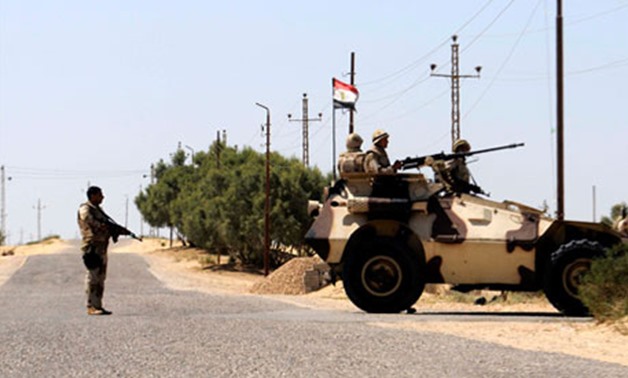
Egyptian army troops in North Sinai- Reuters
CAIRO – 27 November 2017: Not all Muslims perform their daily five prayers, but they are all keen on attending Friday prayers whose importance is mentioned in the Holy Quran many times. Egyptians are moderate Muslims and known for their ‘religious nature’ since the Pharaonic era which dates to 3000 years B.C.
Muslims perform their prayers at mosques, homes, streets, work places…etc. There are no restrictions mentioned in the Quran or the Hadith [Prophet Mohamed’s sayings and teachings] on venues for prayers. Islam embraces various doctrines most importantly the Sunni, Shiite, Salafism and Sufism schools. However, all Muslims can perform their prayers, despite the essential differences between Sunnis and Shiites.
On November 24, 2017, nearly 25 armed terrorists attacked Al-Rawdah mosque, located in northern Sinai, and killed over 305 worshippers. Although no organization has claimed responsibility for that terror attack, the only one of its kind in Egypt in modern history, ISIS is blamed for it, despite vehement denials by its online supporters.
Terrorist groups in Sinai
Ansar Beit al-Maqdis is a militant group that pledged allegiance to Abu Bakr al-Baghdadi, the leader and so-called caliph of IS, in November 2014, and renamed itself as the Sinai Province [Welayet Sinai]. It claimed responsibility for most of the major attacks against security forces and their installations and Copts in Egypt.
There are other militant groups in Sinai where Egyptian security and military forces are fighting. Ajnad Misr group is affiliated to al-Qaeda organization. Not all terrorist groups are alike in their ideology and mission.

We should also keep in mind that not all militant groups have the same tactical or strategic goals, nor are their approaches to political Islam identical. In other words, al-Qaeda and IS are in operative and physical conflicts with each other. Al-Qaeda’s Ayman al-Zawahri and Baghdadi have exchanged accusations of seeking division among ‘Jihadists’ and even betrayal to regular regimes and armies.
Hasam is another militant group that has recently formed in Egypt and claimed responsibility for many attacks against police and military personnel inside Cairo and Giza. Ironically the militant group released a statement condemning the terror attack at al-Rawdah mosque.
 Terrorists’ despair
Terrorists’ despair
Terrorist groups active in Egypt, particularly in Sinai, have alleged that they are fighting against what they call “the Egyptian regime’s tyranny and polytheists.” Dozens of security personnel were killed by these groups, in addition to dozens of Copts.
Terrorists always look for new enemies and new battlefields when they run out of justifications and groundless excuses. Killing is a definite and easy punishment to all these groups’ opponents. In November 2016, a 97-year-old Sheikh was beheaded by IS’s branch in Sinai on allegations that he is a polytheist and claims being equal to Allah in predicting the future.
The Islamic State’s own publication, al-Naba’, made it clear last December that it considered Sufism to be one of the main “diseases” it aimed to treat in Egypt. In an interview with Sinai Province’s religious police official, he mentioned Al-Rawdah mosque as their future target to attack.
“Our main focus, however, is to wage a war against the manifestations of polytheism including Sufism,” said the IS official; issuing a warning to other Sufis living in Egypt, saying that their “blood is filthy and permissible to shed.”
Strategic turning-point in terrorist ideology
Targeting Muslim worshippers in Egypt is a key turning point in the ideology of terrorist groups active in Egypt. Targeting security personnel was justified to many supporters who have common enmity with the Egyptian regime such as the Muslim Brotherhood members and Salafists.
When terrorists attacked the Copts in Alexandria, Minya and even in Tanta, they succeeded to find a justification that the Egyptian Copts cooperated with the Egyptian regime and played a key role in toppling the Muslim Brotherhood’s Mohamed Morsi after only one year in rule.
This time no sympathizers of the Sinai Province, which hurried in expressing their pride of killing and terrorizing innocents, are expected to welcome that terror attack against Muslim worshippers who were killed during their Holy Friday prayer.
Comments
Leave a Comment